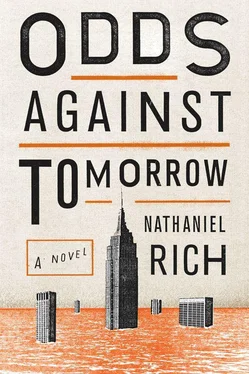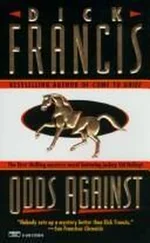“I’m here to see Jason Tanizaki,” said Mitchell. “I’m from FutureWorld.”
The guard kept his eye on Mitchell while he dialed the intercom.
“Mr. Tanizaki has a visitor.” The guard paused and stared balefully into Mitchell’s eyes. “He says he is the man from the future.”
5.
Seven people were seated around the oval marble conference table. Six of them stood when Mitchell entered the room.
“The man of the hour,” said Jason Tanizaki, extending his soft fingers.
Mitchell had liked Tanizaki as soon as they met, a month earlier. He was a thin, tall man with elongated features, and he dressed like a Ferragamo model; today he wore uncreased chocolate loafers, a trim navy suit, and a thickly knotted aqua-blue tie. His elegance extended even to his posture. During their consultations he sat with his ankles crossed, hands pressed together, and head cocked, as if in pleasant anticipation of whatever Mitchell had to say. Watching Tanizaki, Mitchell marveled at the natural effortlessness with which the powerful administered their affairs. No matter how hard Mitchell worked at it, his every action seemed to him freighted with the weight of Kansas City, his father, the Zukorminiums, thick Hungarian gravy on fatty sides of veal, saggy pelican-mouth briefcases with chipped bronze clasps.
Mitchell walked right up to the edge of the table so that no one could see his leaking shoes.
“Please,” he said, “sit.” He noticed there was nowhere for him to sit, so he remained standing.
“You will be pleased to know,” said Tanizaki, “that Lady Madeline has purchased a headset for every one of our employees.”
In their previous session they had discussed the problem of widespread cell phone use among Lady Madeline’s staff, particularly their traveling salesmen.
“Glad to hear that,” said Mitchell. “You’ve spared yourself innumerable negligence lawsuits and a surge in oncology-related health-care expenses.”
Tanizaki introduced his colleagues, who nodded as they were named. Finally he came to the slumped batrachian form at the head of the table. It was Lady Madeline D’Espy herself, the company’s founder, whose legendary beauty hadn’t faded so much as expired; she was decades past the sell-by date. Her face, blotted with heavy rouges and pinks, rested low in the hollow of her neck, but the eyes had retained a sharp brown lucidity. They peered out beneath eyebrows that had been sketched slightly too high up on her forehead, giving the impression of being raised, perpetually, in skepticism.
Mitchell began his doomsday hurricane analysis by explaining that Lady Madeline needed to move quickly. The Middlesex factory had to be shut down immediately. All chemical substances and laboratory equipment should be moved belowground, preferably to a sealed storm cellar. The New York office must close tomorrow, the day the hurricane was expected to make landfall. Employees who lived in the city should leave for higher ground inland. Anyone with no choice but to remain in New York should consult the city’s online flood map to see whether his apartment lay in an official evacuation zone. If so, he should locate the nearest hurricane shelter. No apartment higher than the tenth floor or lower than the fourth floor was safe. All employees had to prepare a Go Bag, containing bottled water, nonperishable food items, a flashlight, batteries, latex gloves, medical history information, iodine tablets—
D’Espy raised a stiff, maculated hand from the table. Though subtle, this gesture seemed to have activated some buzzer beneath each person’s seat cushion — all her employees abruptly turned to face her. She released a long, profound sigh that seemed to emanate from the pit of her soul. Finally, assured that she had their attention, she blinked her eyes deliberately several times and the edges of her mouth began to rise. It slowly dawned on Mitchell that this was meant to be interpreted as a smile. D’Espy spoke in a hoarse monotone.
“I don’t buy it.”
Surprised, Mitchell waited for a signal.
“Oh, and Jason,” she said, turning to Tanizaki, “I don’t buy the business about cell phones causing cancer either.”
Tanizaki’s expression — open mouth, wide eyes — was one that Mitchell would never have imagined possible on such a professional, elegant face. It was a look of pure, abject fear.
“I’ve known two Tammys in my life,” said D’Espy. “One was a Puerto Rican maid who did the dishes for me back in the nineties. Tampíco Tammy. Mentally deficient, she was. You had to remind her, every single time, to wash both sides of a plate, or else you’d find it grimy with last night’s rice or some other horror. The other Tammy, Tammy Martin, used to run with my sister in high school. Big fat slutty girl, that one. Both Tammys, I should add, were extremely docile. Wouldn’t hurt a bug.”
Her employees, other than Tanizaki, chuckled ostentatiously.
“Ms. D’Espy,” said Mitchell, “with all due respect. The National Weather Service is now reporting that Tammy is a Category Two hurricane. It may strengthen to a Category Three, or even Four. We’ve already had some flooding today. You see, the drought has made the land incapable of absorbing such massive rainfall.”
“I’ve been in this city, in this business, for forty-five years. I’ve never seen anything like what you’re predicting. On the Gulf Coast, maybe. Not here.”
“In 1938 a Category Three hurricane hit seventy miles away, on Long Island. But still the East River flooded three avenues inland.”
“Even I wasn’t born then.”
“On December eleventh, 1992, a storm shut down Manhattan. That was only a nor’easter.”
“I remember that day, and I remember the storm in 2012. Very windy. We all came to work anyway, and there were no serious problems at the factory. Do you have any idea how much it would cost us to close the factory?” As she glared at him Mitchell began to wonder whether her eyes, like her eyebrows, had been painted on. “Closing the factory,” she continued, “is a lot more expensive than purchasing these moronic earpieces for everybody’s little phones.”
Mitchell felt unpleasantly warm all of a sudden.
“Ms. D’Espy,” said Tanizaki. He paused, blinking, as if in an effort to catch his breath. “I believe that Mr. Zukor is suggesting that we might be encountering a once-in-a-lifetime storm. A natural disaster that might threaten our lives.”
For whatever reason — D’Espy’s skepticism or the look of alarm on Tanizaki’s immaculate face — the hurricane began to feel more real. It was like stepping out of a movie theater and into the street when the light is too sharp. The air went out of Mitchell’s throat. He stared at the green vase in the middle of the conference table, and there, in the rippling glass, was the shifting surface of the horseshoe-shaped lake that lay beside Camp Ticonderoga. The water was swirling now, faster and faster, spinning like a black hole, and it was exerting a gravitational pull on the table, on the people in their cleanly pressed business suits, sucking them into its vortex, where they would drown.
“Mitchell?”
He looked up. They were waiting for his response. D’Espy rocked in her chair like a judge.
“Ms. D’Espy,” he said. “I apologize. You are correct.”
Tanizaki stiffened in his chair.
“It is true that a Category Four hurricane — even a Category Three hurricane — would have a catastrophic effect on the city. Windows, walls, and exterior cladding would fall to the sidewalk, killing anyone unlucky enough to be standing below. Pedestrians seeking shelter underground would drown. Every rail-tunnel system, including most subway stations, would flood. At high tide, the rivers could surge as high as thirty-two feet above normal water levels. Much of Manhattan could be submerged. Days, if not weeks would pass before the authorities would be able to restore any semblance of order. A factory like yours in Middlesex, just a mile from the coast, would suffer tremendous damage. The windows would shatter and the building would flood. The chemicals stored in the laboratories would be released, causing explosions and releasing poisonous gas into the atmosphere. Overnight your business would lose most of its value.”
Читать дальше












